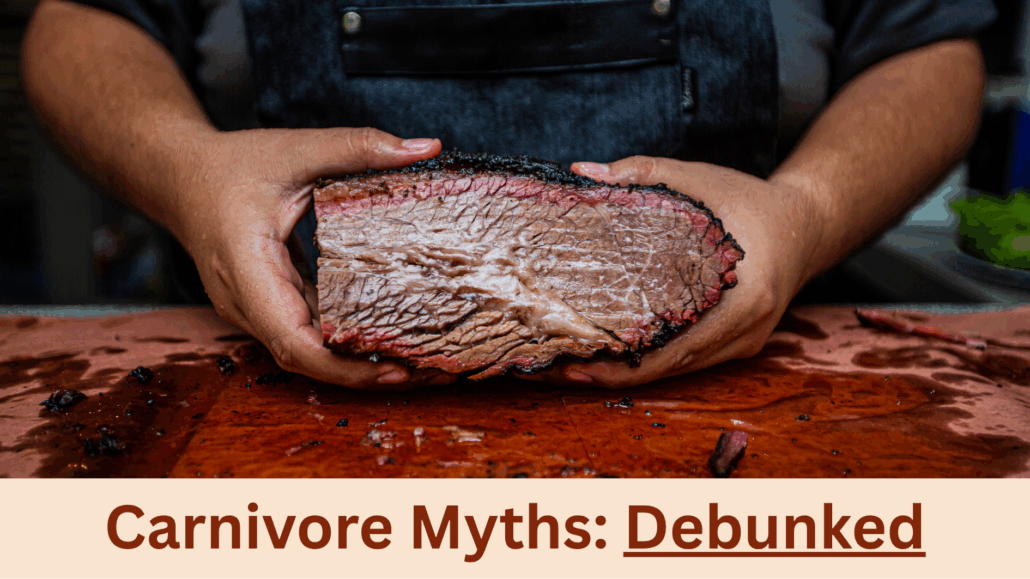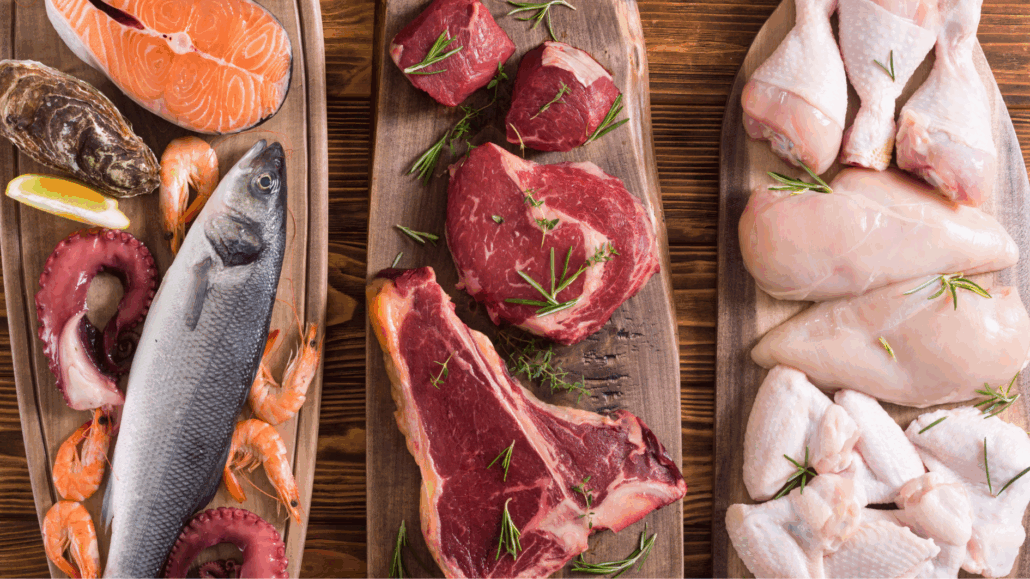We include products in articles we think are useful for our readers. If you buy products or services through links on our website, we may earn a small commission.
5 Meat Myths Debunked: Busting the Top Misconceptions About Carnivore Eating

Table of Contents
The carnivore lifestyle is drawing increasing attention for its potential health benefits—especially in fertility, inflammation, autoimmune issues, and metabolic wellness. But with popularity comes misinformation. Misconceptions around eating only animal products often stem from outdated science, ideological biases, or simply misunderstanding what this lifestyle is really about.
Let’s clear the air by debunking the top myths about carnivore eating—based on current science and clinical insights.
Myth #1: “Meat rots in your colon.”
This is one of the most pervasive, and incorrect, claims made against meat consumption. In reality, meat is efficiently digested in the small intestine. Unlike fiber, which largely passes into the colon undigested, meat is broken down into amino acids and absorbed well before reaching the large intestine [1, 2].
Human digestive systems are designed to extract nutrients from animal proteins and fats with remarkable efficiency. Protein digestibility from animal sources often exceeds 90% [2]. In those following a carnivore lifestyle, bowel movements may decrease in frequency, not because of rotting food, but due to the low residue left behind after meat is digested.
Myth #2: “You need plants for fiber.”
While fiber has long been promoted as essential for gut health, many individuals actually experience improved digestion and relief from issues like bloating, constipation, and IBS when fiber is significantly reduced or removed. This is especially true for those with inflammatory or autoimmune gut conditions, where certain types of fiber or plant compounds can exacerbate symptoms [3, 4].
In a carnivore way of life, the digestive system gets a break from potentially irritating plant compounds like lectins, oxalates, and insoluble fibers. While cooking can reduce anti-nutrient levels, these compounds can still interfere with nutrient absorption or cause digestive distress in sensitive individuals [5, 6]. The result? For many, a calmer, more resilient gut environment.
Myth #3: “A meat-based lifestyle will give you heart disease.”
The association between saturated fat, cholesterol, and heart disease has been largely challenged by modern research. Multiple meta-analyses and reviews have shown no clear link between saturated fat intake from whole foods like unprocessed meat and cardiovascular events [7]. Moreover, cholesterol is a foundational building block for hormone production, including the sex hormones critical for fertility [8, 9].
What matters more than isolated cholesterol numbers is metabolic health as a whole. When insulin resistance, chronic inflammation, and oxidative stress are addressed, often improved through a carnivore or animal-based approach, markers for heart health tend to stabilize or improve [10].
Myth #4: “You’ll be nutrient-deficient without fruits and vegetables.”
This misconception assumes that only plants provide key vitamins and minerals. But organ meats, eggs, and fatty cuts of ruminant animals are some of the most nutrient-dense foods on the planet [11].
Iron (in its most bioavailable heme form), B12, zinc, vitamin A (as retinol), omega-3s, and choline are all abundant in animal foods and are often more readily absorbed by the human body compared to their plant-based counterparts [12, 13]. Many of the nutrients found in plants come in forms that are harder for the human body to absorb, or are bound to anti-nutrients that hinder absorption altogether [5, 6]. With proper variety, especially including organ meats and fatty cuts, those following a carnivore way of life often experience better nutrient status than before.
Myth #5: “The carnivore lifestyle isn’t sustainable long-term.”
While any lifestyle must be personalized, many individuals have reported thriving on a carnivore way of life for years, physically, mentally, and emotionally. This includes anecdotal improvements in energy, fertility, skin clarity, autoimmunity, and mental health [14, 15].
Sustainability isn’t just about what works on paper—it’s about what people can consistently maintain with positive outcomes. While some concerns exist regarding potential long-term nutrient deficiencies or gut microbiome changes without careful planning, a carnivore lifestyle, when done thoughtfully and with adequate fat intake, can be not only sustainable but transformative for many individuals [14, 15].
Final Thoughts: Look to Evolution and Results
Humans have evolved eating animal foods for hundreds of thousands of years, with meat playing a significant role in our ancestors’ diets, contributing to higher energy levels and brain development [16, 17]. While this way of life may seem unconventional in today’s plant-forward culture, the science behind it, and the growing body of personal success stories, suggests it’s anything but extreme.
The goal isn’t to follow trends, but to find what nourishes the body best. For many, that’s a return to simplicity: high-quality, nose-to-tail animal foods, eaten with intention and purpose.
If you’re interested in taking control of your health, check out the 30 Days To Carnivore course, which includes lifetime access to carnivore meal plans, realistic shopping lists, recipes, daily video courses, and expert advice.
References:
- National Institute of Diabetes and Digestive and Kidney Diseases (NIDDK). Your Digestive System & How it Works. Available at: https://www.niddk.nih.gov/health-information/digestive-diseases/digestive-system-how-it-works
- Windey, K., De Preter, V., & Verbeke, K. (2012). Insights in the effects of protein intake on the composition and activity of the gut microbiota. Frontiers in Physiology, 3, 404. Available at: https://www.ncbi.nlm.nih.gov/books/NBK507976/ (Note: This specific book chapter was referenced in a search result, direct access to the full book may vary.)
- Medical News Today. Fiber for IBS: Which type is best?. Available at: https://www.medicalnewstoday.com/articles/fiber-for-ibs
- Giacomelli, L., et al. (2023). Constipation-Predominant Irritable Bowel Syndrome (IBS-C): Effects of Different Nutritional Patterns on Intestinal Dysbiosis and Symptoms. Nutrients, 15(7), 1647. Available at: https://pubmed.ncbi.nlm.nih.gov/37049488/
- Nourish. Are Lectins Bad for Your Gut Health?. Available at: https://www.usenourish.com/blog/are-lectins-bad-for-you
- iTHRIVE. Health Saboteurs – Antinutrients. Available at: https://www.ithrivein.com/blog/health-saboteurs-antinutrients
- Astrup, A., et al. (2020). Saturated Fats and Health: A Reassessment and Proposal for Food-Based Recommendations: JACC State-of-the-Art Review. Journal of the American College of Cardiology, 76(7), 844-857. Available at: https://www.jacc.org/doi/10.1016/j.jacc.2020.05.077
- Instituto Bernabeu. What impact does cholesterol have on my fertility?. Available at: https://www.institutobernabeu.com/en/blog/impact-cholesterol-fertility/
- Healthline. Cholesterol and Progesterone: Important Roles in Pregnancy. Available at: https://www.healthline.com/health/cholesterol-and-progesterone
- DiNicolantonio, J. J., & O’Keefe, J. H. (2025). The energy model of insulin resistance: A unifying theory linking seed oils to metabolic disease and cancer. Frontiers in Nutrition, 11. Available at: https://www.frontiersin.org/journals/nutrition/articles/10.3389/fnut.2025.1532961/full
- Colorado State University. What is offal? Here’s why organ neat is healthy and sustainable. Available at: https://source.colostate.edu/offal-organ-meat-facts-nutrition/
- BeefResearch.ca. Nutritional Qualities of Beef. Available at: https://www.beefresearch.ca/topics/nutritional-qualities-of-beef/
- Healthline. 16 Foods That Are High in Choline. Available at: https://www.healthline.com/nutrition/foods-with-choline
- GlobalRPH. Long-term Health Concerns of the Carnivore Diet – For Health Care Professionals. Available at: https://globalrph.com/2025/02/long-term-health-concerns-of-the-carnivore-diet-for-health-care-professionals/
- News-Medical.net. Is The Carnivore Diet Healthy?. Available at: https://www.news-medical.net/health/The-Carnivore-Diet-Healthy-Trend-or-Risky-Fad.aspx
- The Australian Museum. Atlas of Living Australia. Available at: https://www.ala.org.au/who-we-are-3/atlas-background/atlas-partners/ala-community/australian-museum/
- The Australian Museum. Human evolution. Available at: https://australian.museum/learn/science/human-evolution/















